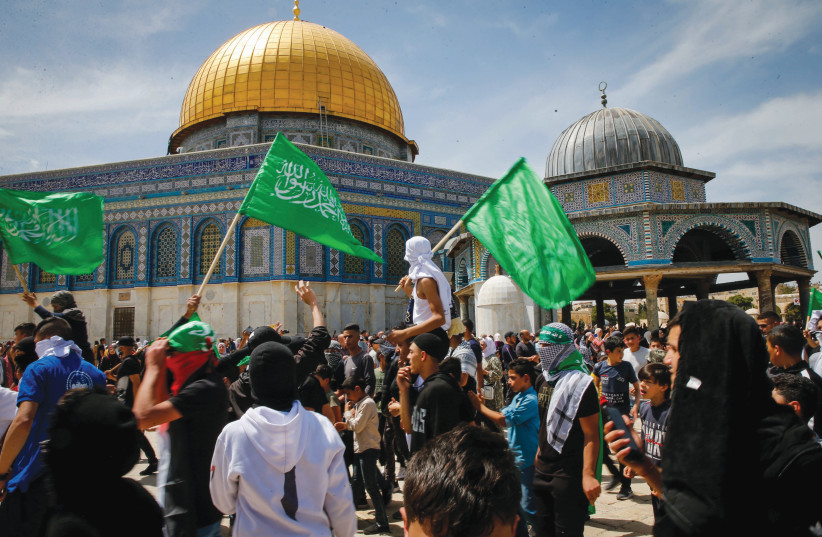Nearly 20 Israelis have been killed in less than two months.
It’s a devastating death toll, which demands a decisive military response against Hamas.
For years, Israel has differentiated between the West Bank and Gaza, a strategy that now needs to change.
Hamas, an Islamist terror group based in the Gaza Strip, has for years inflamed the Palestinian street in the West Bank, urging lone wolves to commit deadly attacks while at the same time attempting to build a strong network in the area.
Israel, both under Prime Minister Naftali Bennett and former prime minister Benjamin Netanyahu, vowed to answer every explosive balloon and every rocket launched from the Gaza Strip with heavy retaliation.
But, at the same time, the IDF has retaliated in ways that would not contribute even further to the deterioration of the already tense environment. So for every explosive balloon or rocket, Israel struck targets that would not damage Hamas.

Jerusalem wants quiet – and the group’s leader in the Strip, Yayha Sinwar, has very craftily played the Israeli government and defense establishment.
Promising that sought-after quiet, Sinwar has been able to get thousands of work permits for Gazans (Israel approved 20,000 work permits in March) as well as other humanitarian aid for the devastated coastal enclave.
At the same time, the former security prisoner (Sinwar served 22 years in an Israeli prison) has continued to increase the group’s rocket arsenal and has been calling for blood to be spilled on the street in the name of al-Aqsa.
A year ago last May, during the 11-day conflict of Guardian of the Walls, Hamas was able to unite Palestinians in the West Bank and Israeli Arabs over Jerusalem and the Temple Mount.
Claiming to be the protector of Jerusalem, Sinwar brought death and destruction to Israel and the Gaza Strip.
This year is not so different. Hamas continues to claim it is the protector of Jerusalem and hundreds of Palestinians have rioted on the compound against Israeli police forces.
But now, instead of rockets being fired toward the holy city, Hamas is instead urging West Bank Palestinians and Israeli-Arabs to destroy their own futures by carrying out deadly attacks within Israel.
Hamas wants to unite. But not at the cost of more rockets on Gaza.
LAST SATURDAY, Sinwar called on Palestinians to use guns, cleavers, knives or axes against Israelis and told them “not to wait for a decision by anyone” before carrying out individual attacks.
And the Palestinian street is listening.
Since March 22, eighteen Israelis have been murdered by Palestinians and Israeli Arabs who have stabbed, shot and swung axes toward civilians and police officers.
In response, Israel has increased its troop presence in the West Bank and has announced it would be calling up reserve forces in order to prevent illegal infiltration of would-be terrorists through holes in the security fence, and that it would go on the offensive inside cities like Jenin.
Hundreds of Palestinians have been arrested since Israel began what it has dubbed “Operation Break the Wave.”
In a warning to Palestinians who might be considering a terror attack, Deputy Commander of the Menashe Regional Brigade Lt.-Col. Alon Hanuni told The Jerusalem Post in a recent interview that the IDF can crack down even further if necessary.
“They are only feeling a small bit of what we can do," he said. "We can bring them back 20 years if we want. We aren’t there yet but we are close. It all depends on them.”
Now, two months into this deadly wave, Israel’s strategy needs to adapt. While simultaneously continuing to act against suspected terrorists in West Bank cities like Jenin, the IDF needs to act against Sinwar and Hamas in their home base in the Gaza Strip.
By revoking the permits and closing the crossings, Israel would hit the Gazan economy like the ax hitting the victims killed in Elad on Thursday night. It would take away their financial independence like the terrorists took away Independence Day from the families of the victims.
The defense establishment can also exact a heavy cost from Hamas – because deadly terror attacks need a heavy-handed response.
Israel can target more strategic infrastructure belonging to Hamas in the Strip, or it can once again carry out targeted assassinations of Hamas leaders in both Gaza and the West Bank.
By doing so, Yahya Sinwar will understand that he can’t have his cake and eat it too. He cannot expect to push Palestinians to kill Israelis while he sits comfortably on his throne in Gaza City – unless he wants to sit inside a bunker like Hassan Nasrallah in Lebanon.
But then again, Israel made it clear last year that it knows how to destroy Hamas’s tunnel system. Israeli officials have already warned the Hamas leader in Gaza that he is on their hit list.
Sinwar needs to know that he is not safe, nor is anyone who calls for or carries out the murder of innocents.
In Sinwar's attempt to unite the West Bank and Gaza, he will destroy them both.
